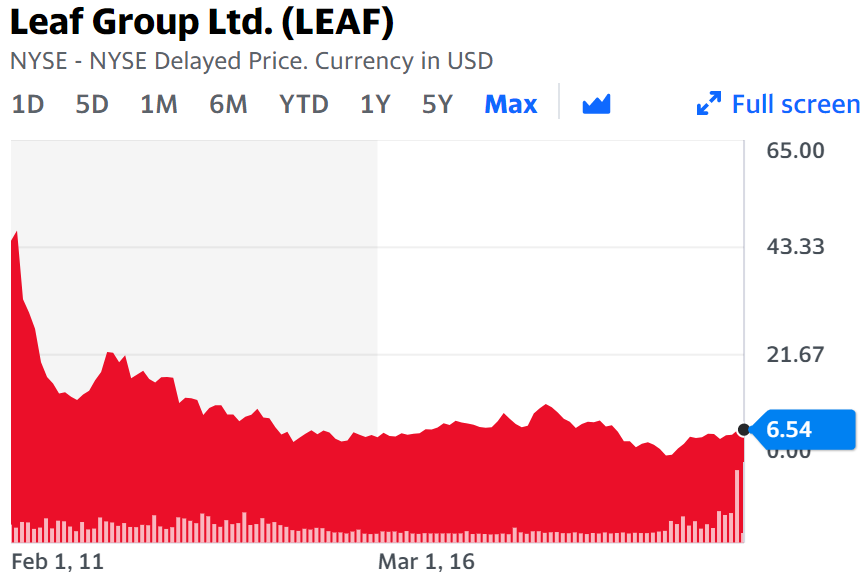On Wednesday SEMrush priced their IPO at $14 a share & listed Thursday.
There have been many marketing and online advertising companies which are publicly traded, but few that were so focused specifically on SEO while having a sizeable market cap. According to this SeekingAlpha post at the IPO price SEMrush had a valuation of about $1.95 to $1.99 billion. For comparison sake, here are some other companies & valuations.
- Facebook acquired Instagram for $1 billion.
- Google acquired YouTube for $1.65 billion.
- Yelp trades at around a $2.9 billion market cap.
- Yahoo! was acquired by Verizon for $4.48 billion.
- Hubspot has a market cap of around $20.4 billion.
A couple years ago Gannett bought AdWords reseller WordStream. A few years before that they bought ReachLocal. The Hearst publishing empire also bought iCrossing long ago. Marin Software remains publicly traded, but they are only valued at about $20 million.
Newspapers reselling Google AdWords ads isn’t really SEO though. Beyond those sorts of deals, many of the publicly traded SEO stuff has been only tangentially relevant to SEO, or crap.
There are some quality category-leading publishers which use SEO as a means of distribution but are not necessarily an SEO service provider like TripAdvisor, BankRate, and WebMD. Over time many of these sorts of companies have been gobbled up by Red Ventures or various private equity firms. Zillow, Yelp and TripAdvisor are some of the few examples which still exist as independent companies.
So that puts most of the publicly traded SEO stuff in one of the following categories…
- small scale – does anyone other than Andy Beal & Mike Grehan still remember KeywordRanking / WebSourced / Think Interactive / MarketSmart Interactive?
- hope and nope – sites like Business.com were repeatedly acquired but never really gained lasting relevance.
- affiliate networks – which reliant on partners with SEO traffic like Quinstreet & Commission Junction. many affiliate networks were hit hard as the barrier to entry in SEO increased over the years. Quinstreet is doing well in some verticals but sold their education division to Education Dynamics for $20 million. CJ was part of the Publicis Groupe acquisition of Epsilon.
- pump and dump scams – Demand Media, owner of eHow, which later rebranded as Leaf Group & still trades at a small fraction of their IPO price.
[Editorial note: 8 days after writing this post LEAF announced a $304.3 million all cash buyout offer from Graham Holdings at 21% above current market prices and was trading at $8.63 a share. If you bought shares at $40 or $30 or $20 and hoped it would at some point come back – nope – the losses are crystalized on a take out. Graham Holdings formerly owned the Washington Post but sold it to Jeff Bezos 8 years ago for $250 million.]
The one lasting counter-example to the above is Barry Diller’s IAC. [edit: added … here is the WSJ recommending the stock 3 months later, even after a big run]
IAC’s innovation ecosystem is surreal. Across time & across markets he is the best creator of vertical leading properties later spun off as their own companies. He’s owned Expedia, TripAdvisor, LendingTree, HomeAdvisor, Match.com, TicketMaster and so many other category leaders. His buying of Ask.com did not pan out as well as hoped as web browsers turned the address bar into a search box, his ability to differentiate the service went away after they shut down the engine in 2008, he was locked out of mobile search marketshare by default placement contracts & Google pushes back against extension bundling, but just about everything else he touched turned to gold. A lot of their current market cap is their ownership of Vimeo, which by itself is valued at $6 billion.
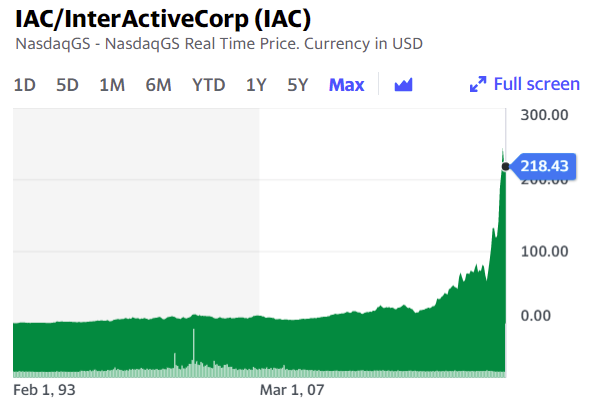
[Added a section on Vimeo here since it was spun out after this post was originally published.] Vimeo was a throw in when IAC bought CollegeHumor owner Connected Ventures. IAC was willing to sell Vimeo to Kodak for around $10 million over a decade ago, but there was no transaction. Around that time I ran a membership website here and we were going to use Vimeo for delivery of our videos but they deleted our paid subscription claiming Vimeo wasn’t for businesses and was just for artistic uses. They probably did that hundreds or thousands of times over the years and then realized … wait, we should allow businesses to use this, everyone else will just upload to YouTube. So they switched focus to business use, YouTube kept increasing ad load, and Vimeo kept becoming more appealing on a relative basis. This year YouTube updated their terms of service allowing them to monetize and and all uploaded videos, which only makes Vimeo look that much more appealing to businesses which are on the face about paying a small monthly subscription for video hosting. When IAC spun out Vimeo this year (VMEO) it was valued at north of $6 billion. Someone like Microsoft could buy it and promote it in Bing search results the way Google does YouTube.
What is the most recent big bet for Barry Diller? MGM. Last August he bet $1 billion on the growth of online gambling. And he was willing to bet another billion to help them acquire Entain:
IAC has to date invested approximately US$1 billion in MGM with an initial investment thesis of accelerating MGM’s penetration of the $450 billion global gaming market. IAC notes in its letter of intent that IAC continues to strongly support this objective for MGM whether or not a transaction with Entain is consummated.
Barry Diller not only accurately projects future trends, but he also has the ability to rehab broken companies past their due dates.
The New York Times bought About.com for $410 million in 2005 & did little with it as its relevance declined over time as its content got stale, Wikipedia grew and search engines kept putting more scraped content in the search results. The relentless growth of Wikipedia and Google launching „universal search“ in 2007 diminished the value of About.com even as web usage was exploding.
IAC bought About.com from the New York Times for $300 million in August of 2012. They tried to grow it through improving usability, content depth and content quality but ultimately decided to blow it up.
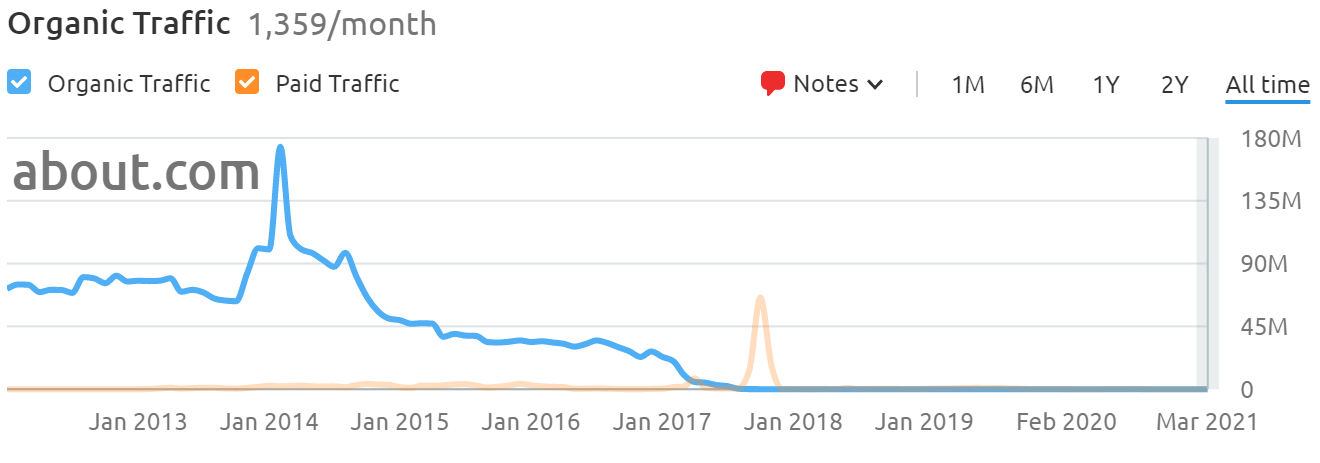
They were bold enough to break it into vertical category branded sites. They’ve done amazingly well with it and in many cases they rank 2, 3, 4 times in the SERPs with different properties like TheSpruce, TheBalance, Investopedia, etc. As newspapers chains keep consolidating or going under, IAC is one of the few constant „always wins“ online publishers.
At its peak TheBalance was getting roughly 2/3 the traffic About.com generated.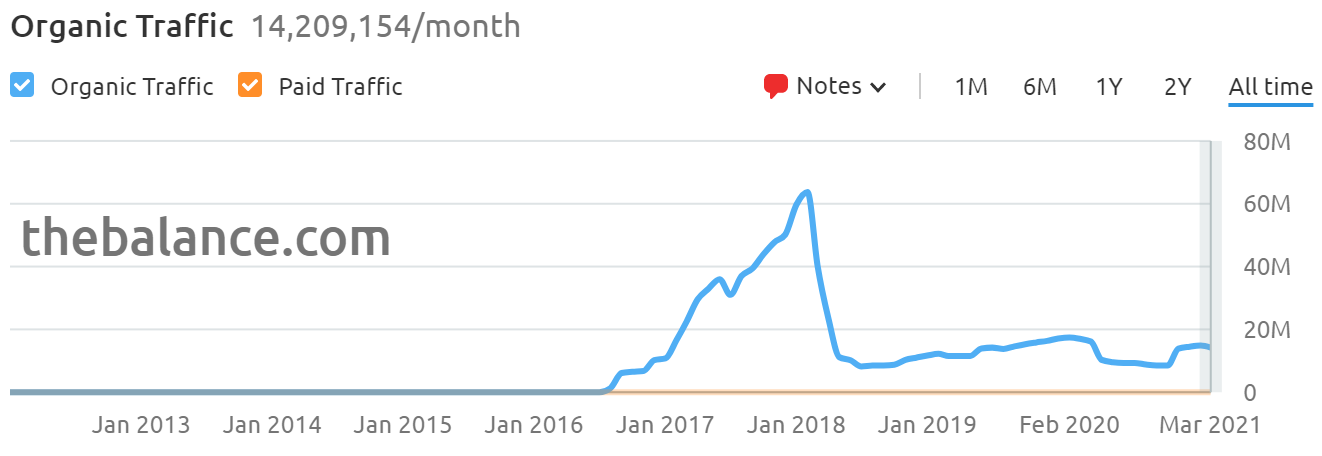
Part of the decline in the chart there was perhaps a Panda hit, but the reason traffic never fully recovered is they broke some of these category sites into niche sites using sub-brands.
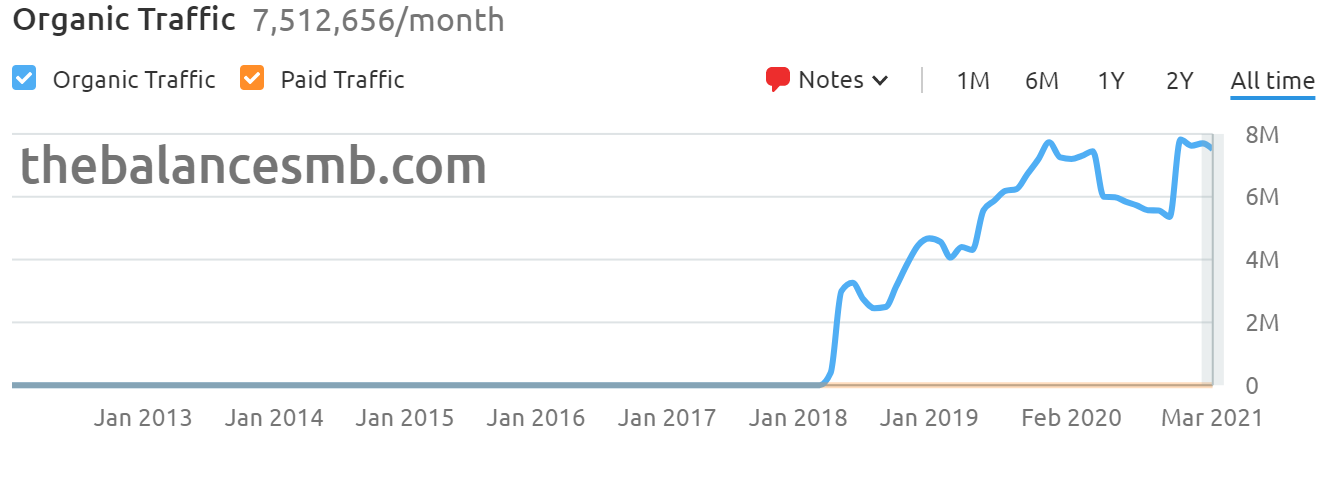
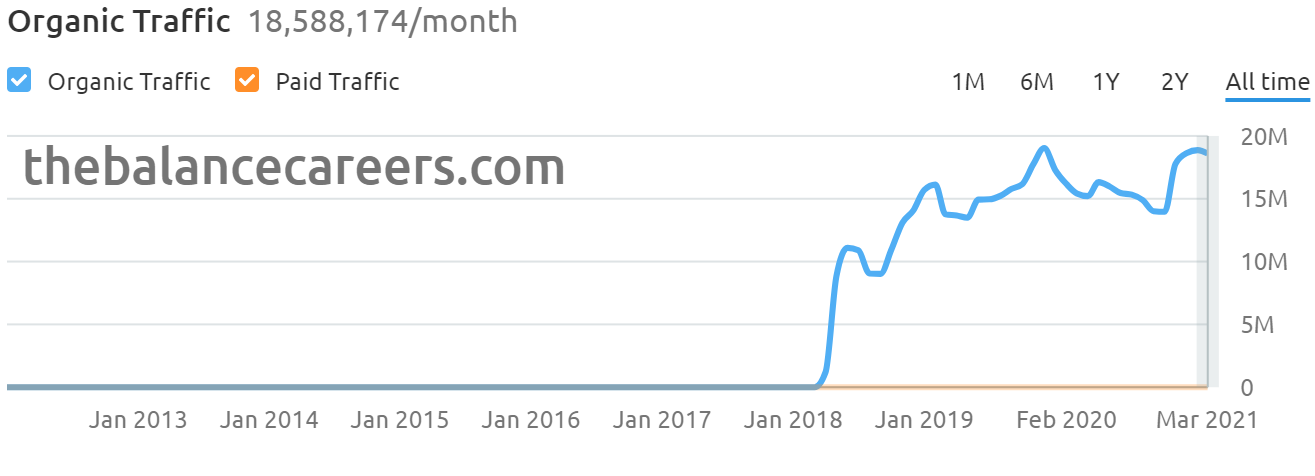
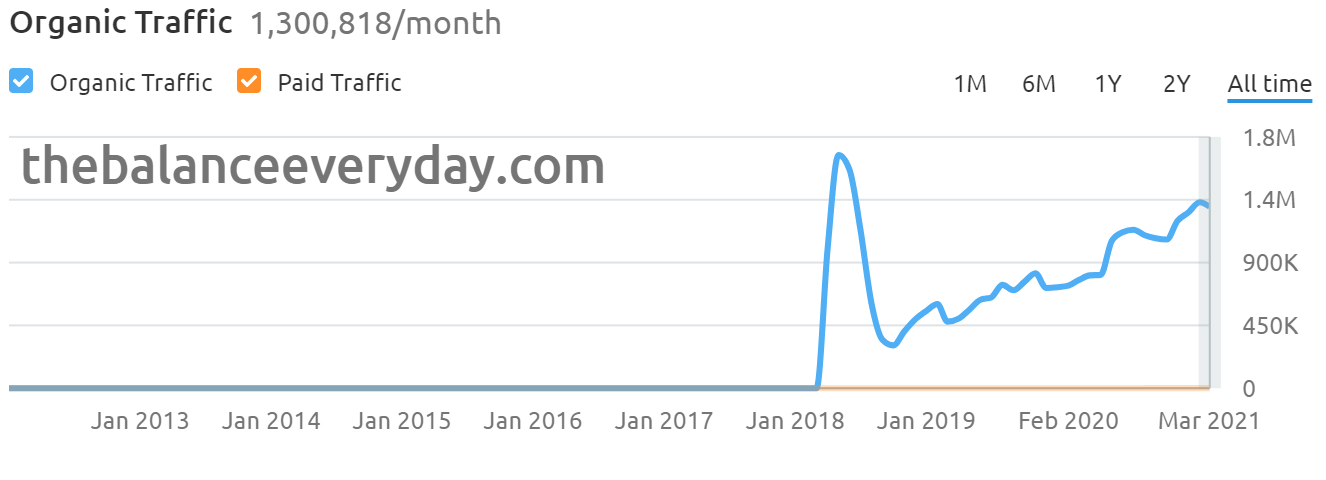
All the above search traffic estimate trend charts are from SEMrush. 
I could do a blog post titled 1001 ways to use SEMrush if you would like me to, though I haven’t yet as I already have affiliate ads for them here and don’t want to come across as a shill by overpromoting a tool I love & use regularly.
I tend to sort of „not get“ a lot of SaaS stocks in terms of prices and multiples, though they seem to go to infinity and beyond more often than not. I actually like SEMrush more than most though & think they’ll do well for years to come. I get the sense with both them and Ahrefs that they were started by programmers who learned marketing rather than started by marketers who cobbled together offerings which they though would sell. If you ever have feedback on ways to improve SEMrush they are fast at integrating it, or at least were in the past whenever I had feedback.
When SEMrush released their S-1 Dan Barker did a quick analysis on Twitter.
Some stats from the S-1: $144 million in annual recurring revenues @ 50% compound annual growth rate, 76% gross margins, nearly 1,000 employees and over 67,000 paying customers.
SEMrush, the SEO tool, has filed to go public. Here’s the S-1: https://t.co/i1meSHts4Y
They spent $54 million on marketing last year, for revenue of $125 million.
(gross profit $95m, net loss $7m) pic.twitter.com/iz5nybcwfA— dan barker (@danbarker) March 1, 2021
At some point a lot of tool suits tend to overlap because much of their data either comes from scraping Google or crawling the open web. If something is strong enough of a point of differentiation to where it is widely talked about or marketed then competitors will try to clone it. Thus spending a bit extra on marketing to ensure you have the brand awareness to be the first tool people try is wise. Years ago when I ran a membership site here I paid to license the ability to syndicate some SEMrush data for our members & I have promoted them as an affiliate for what seems like a decade now.
When Dan Barker did his analysis of the S-1 it made me think SEMrush likely has brighter prospects than many would consider. A few of the reasons I could think of off the top of my head:
- each day their archive of historical data is larger, especially when you consider they crawl many foreign markets which some other competitive research tools ignore
- increasing ad prices promote SEO by making it relatively cheaper
- keyword not provided on organic search means third party competitive analysis tools are valuable not only for measuring competitors but also measuring your own site
- Google Ads has recently started broadening ad targeting further and hiding some keyword data so advertisers are paying for clicks where they are not even aware what the keyword was
That last point speaks to Google’s dominance over the search ecosystem. But it is also so absurd that even people who ran AdWords training workshops point out the absurdity.
Yesterday’s announcement on match type changes had me crawling through query data this morning. I’m staring at many 2-3 word exact match keywords that are matching to 8-word queries. G thinks ‚deck paint‘ and ‚how do i put paint on my deck‘ mean the exact same thing. CPA is 10x.— Brad Geddes (@bgtheory) February 5, 2021
In Google maximizing their income some nuance is lost for the advertiser who must dig into N-Gram analysis or look at historical data to find patterns to adjust:
The account overall has a CPA in the $450 range. If the word ‘how‘ is in the query, our CPA is over double. If someone searches for ‘quote,‘ our CPA is under $300. If they ask a question about cost, the CPA is over $1000. Obviously, looking for quotes versus cost data is very different in the eyes of a user, but not in the matching search terms of Google.
Every ad network has incentive to overstate its contribution to awareness and conversions so that more ad budget is allocated to them.
- Facebook kept having to restate their ad stats around video impressions, user reach, etc.
- Facebook gave themselves a 28 day window for credit for some app installs.
- Google AMP accidentally double counted unique users on Google Analytics (drives adoption = good).
- Google Analytics came with last click attribution, which over-credits the search channel you use near the end of a conversion journey.
There are a lot of Google water carriers who suggest any and all of their actions are at worst benevolent, but when I hear about hiding keyword data I am reminded of the following quote from the Texas AG Google lawsuit.
„Google employees agreed that, in the future, they should not directly lie to publishers, but instead find ways to convince publishers to act against their interest and remove header bidding on their own.“
That lawsuit details the great lengths Google went to in order to leverage their search monopoly to keep monopoly profit margins on their display ad serving business.
AMP was created with the explicit intent to kill header bidding as header bidding shifted power and profit margins to publishers. Some publishers saw a 50% rise in ad revenues from header bidding.
Remember how Google made companywide bonuses depend on the performance of the Google Facebook clone named Google+? Google later literally partnered with Facebook on a secret ad deal to prevent Facebook from launching a header bidding solution. The partnership agreement with Facebook explicitly mentioned antitrust repeatedly.
Bid-rigging?! Is this bid-rigging? As in, one of the „supreme evils of antitrust“? As in, the thing that if RE investors do it at foreclosure auctions they go to prison? pic.twitter.com/w7ez6gwfZd— John Newman (@johnmarknewman) December 16, 2020
When a company partners with its biggest direct competitor on a bid rigging scheme you can count on it that the intent is to screw others.
So when you see Google talk about benevolence, remember that they promise to no longer lie in the future & only deceive others into working against themselves via other coercive measures.
We went from the observation that you can’t copyright facts to promoting opinion instead:
The Internet commoditized the distribution of facts. The „news“ media responded by pivoting wholesale into opinions and entertainment.— Naval (@naval) May 26, 2016
to where after many thousands of journalists have been laid off now the „newspaper of record“ is promoting ponzi scheme garbage as a performance art piece:
The NYT made a NFT!
My new column is about NFTs, and I also turned the column into a NFT and put it up for auction on @withFND, with proceeds going to charity.
Bid away, and you could own the first NFT in the paper’s 170-year history. https://t.co/9ItGZvID8B— Kevin Roose (@kevinroose) March 24, 2021
Is it any wonder people have lost trust in institutions?
A one-hour @CBCNews special that examines the media’s role in the polarization of America and the unmaking of a citizen — Big News is now streaming. pic.twitter.com/tm5QB2P4Ro— CBC Gem (@cbcgem) March 26, 2021
The decline of About.com was literally going to be terminal without the work of Barry Diller to revive it. That slide reflected how over time a greater share of searches never actually leave Google:
Of those 5.1T searches, 33.59% resulted in clicks on organic search results. 1.59% resulted in clicks on paid search results. The remaining 64.82% completed a search without a direct, follow-up click to another web property. Searches resulting in a click are much higher on desktop devices (50.75% organic CTR, 2.78% paid CTR). Zero-click searches are much higher on mobile devices (77.22%)
The data from the above study came from SimilarWeb, which is another online marketing competitive research tool planning on going public soon.
Google „debunked“ Rand’s take by focusing on absolute numbers instead of relative numbers. But if you keep buying default placements in a monopoly ecosystem where everyday more people have access to a computer in their pocket you would expect your marketshare and absolute numbers to increase even if the section of pie other publishers becomes a smaller slice of a bigger pie.
Google’s take there is disingenuous at the core. It reminds me of the time when they put out a study claiming brand bidding was beneficial and that it was too complex and expensive for advertisers to set up a scientific study, without any mention of the fact the reason that would be complex and expensive is because Google chooses not to provide those features in their ad offering. That parallels the way they now decide to hide keyword data even from paying advertisers in much the same way they hide ad fees and lie to publishers to protect their ad income.
Google suggests they don’t make money from news searches, but if they control most of the display ads technology stack & used search to ram AMP down publishers throats as a technological forced sunk cost while screwing third party ad networks and news publishers, Google can both be technically true in their statement and lying in spirit.
„Google employees agreed that, in the future, they should not directly lie to publishers, but instead find ways to convince publishers to act against their interest and remove header bidding on their own.“
There are many more treats in store for publishers.
Google Chrome stopped sending full referrals for most web site visitors late last year. Google will stop supporting third party cookies in Chrome next year. They’ve even floated the idea of hiding user IP addresses from websites (good luck to those who need to prevent fraud!).
Google claims they also going to stop selling ads where targeting is based on tracking user data across websites:
„Google plans to stop selling ads based on individuals‘ browsing across multiple websites, a change that could hasten upheaval in the digital advertising industry. The Alphabet Inc. company said Wednesday that it plans next year to stop using or investing in tracking technologies that uniquely identify web users as they move from site to site across the internet. … Google had already announced last year that it would remove the most widely used such tracking technology, called third-party cookies, in 2022. But now the company is saying it won’t build alternative tracking technologies, or use those being developed by other entities, to replace third-party cookies for its own ad-buying tools. … Google says its announcement on Wednesday doesn’t cover its ad tools and unique identifiers for mobile apps, just for websites.“
Google stated they would make no replacement for the equivalent of the third party cookie tracking of individual users:
„we continue to get questions about whether Google will join others in the ad tech industry who plan to replace third-party cookies with alternative user-level identifiers. Today, we’re making explicit that once third-party cookies are phased out, we will not build alternate identifiers to track individuals as they browse across the web, nor will we use them in our products. We realize this means other providers may offer a level of user identity for ad tracking across the web that we will not — like PII graphs based on people’s email addresses. We don’t believe these solutions will meet rising consumer expectations for privacy, nor will they stand up to rapidly evolving regulatory restrictions, and therefore aren’t a sustainable long term investment.“
On the above announcement, other ad networks tanked, with TheTradeDesk falling 20% in two days.
These are all Google’s competitors in advertising technology, collapsing after Google announced that it won’t let them do targeted advertising anymore, but that Google itself will continue to do it. https://t.co/S6Axcrw5a0— Matt Stoller (@matthewstoller) March 5, 2021
Competing ad networks wonder if Google will play by their own rules:
“One clarification I’d like to hear from them is whether or not it means there’ll be no login for DBM [a historic name for Google’s DSP], no login for YouTube and no login for Google properties. I’m looking for them to play by the same rules that they so generously foisted upon the rest of the industry,” Magnite CTO Tom Kershaw said.
Regulators are looking into antitrust implications:
„Google’s plan to block a popular web tracking tool called “cookies” is a source of concern for U.S. Justice Department investigators who have been asking advertising industry executives whether the move by the search giant will hobble its smaller rivals, people familiar with the situation said.“
The web will continue to grow more complicated, but it isn’t going to get any more transparent anytime soon.
„Google employees agreed that, in the future, they should not directly lie to publishers, but instead find ways to convince publishers to act against their interest and remove header bidding on their own.“
As the Attention Merchants blur the ecosystem while shifting free clicks over to paid and charging higher ad rates on their owned and operated properties it increases the value of neutral third party measurement services.
The trend is not too hard to notice if you are remotely awake.
While I was writing this post Google announced the launch of a „best things“ scraper website featuring their scraped re-representations of hot selling items. And they are cross-promoting competitors in „knowledge“ panels to dilute brand values & force the brand ad buy.
Oh man. Check out this bullshit on our GMB Knowledge Panel. Are they going to list competitors on everyone’s listings now? pic.twitter.com/ITwiZGyRxs— Darren Shaw (@DarrenShaw_) March 26, 2021
Shortly after Google launched their thin affiliate scraper site full of product ads they announced an update to demote other product review sites.
Where Google can get away with it, they will rig things in their favor to rip off other players in the ecosystem:
Google for years operated a secret program that used data from past bids in the company’s digital advertising exchange to allegedly give its own ad-buying system an advantage over competitors, according to court documents filed in a Texas antitrust lawsuit. The program, known as “Project Bernanke,” wasn’t disclosed to publishers who sold ads through Google’s ad-buying systems.
If I could give you one key takeaway here, it would be this:
„Google employees agreed that, in the future, they should not directly lie to publishers, but instead find ways to convince publishers to act against their interest and remove header bidding on their own.“
Source:: seobook.com
